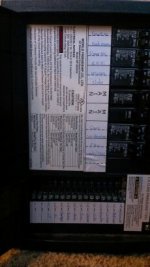DuaneG
Well-known member
Our 33RK has been in the shop 2 1/2 months out of the last 3. Most issues have been resolved, but we still have electrical problems.
We still have a problem when the slides are closed and we are pulling the unit. We turn on the propane and fridge and the slide fuse blows.
The shop traced wires and tightened where they could. Re-wired a few things and checked amp readings. It got to the point that when all three slide wires were connected to the panel it was still blowing the fuse, but not when each slide was connected individualally. They finally got to the point where it wasn't blowing so I picked it up for the fourth time.
I pulled it 30 miles and when I parked it the 30 amp fuse at the battery and the 15 amp slide fuse had blown.
I trickle charged the battery and reconnected it. The fuses did not blow right away with slides open or closed.
We decided to take on a trip to test things out a little more. We turned fridge on propane and started to drive. I checked it several times on the way and the fuses were fine. But four hours later the 15 amp fuse blew again.
It seems to happen more frequently when the battery is low. When there is a low battery I would think things would just not work and not be able to blow a fuse. Can low battery be an issue?
We checked loose connections and looked for wires being pinched as they enter the slide (as others have mentioned) but could not find any issues. Many connections have been tightened and this may have helped because the frequency of blowing fuses has lessened, but it still is not resolved.
Can the fridge circuits or other electronic issues be causing all these issues or does it have to be related the the slides?
The converter was replaced and not sure what to check next. Going nuts, so please help if you can.
Sent from my cell phone. Please forgive typos and spelling errors.
We still have a problem when the slides are closed and we are pulling the unit. We turn on the propane and fridge and the slide fuse blows.
The shop traced wires and tightened where they could. Re-wired a few things and checked amp readings. It got to the point that when all three slide wires were connected to the panel it was still blowing the fuse, but not when each slide was connected individualally. They finally got to the point where it wasn't blowing so I picked it up for the fourth time.
I pulled it 30 miles and when I parked it the 30 amp fuse at the battery and the 15 amp slide fuse had blown.
I trickle charged the battery and reconnected it. The fuses did not blow right away with slides open or closed.
We decided to take on a trip to test things out a little more. We turned fridge on propane and started to drive. I checked it several times on the way and the fuses were fine. But four hours later the 15 amp fuse blew again.
It seems to happen more frequently when the battery is low. When there is a low battery I would think things would just not work and not be able to blow a fuse. Can low battery be an issue?
We checked loose connections and looked for wires being pinched as they enter the slide (as others have mentioned) but could not find any issues. Many connections have been tightened and this may have helped because the frequency of blowing fuses has lessened, but it still is not resolved.
Can the fridge circuits or other electronic issues be causing all these issues or does it have to be related the the slides?
The converter was replaced and not sure what to check next. Going nuts, so please help if you can.
Sent from my cell phone. Please forgive typos and spelling errors.

